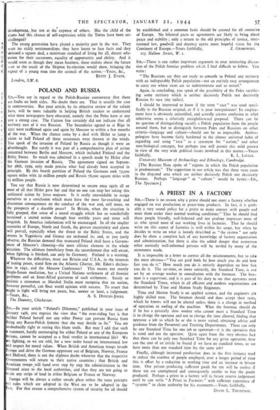A PRIEST IN A FACTORY SIR, —There is no reason why
a priest should not enter a factory whether engaged on war production or peace-time products. In fact, it is prob- ably a very sound policy for a priest to make contact with people and meet them under their normal working conditions.'" That he should find these people friendly, well-behaved and not profane impresses none of us who spend most of our working lives in factories. That he should write on this aspect of factories is well within his scope, but when he decides to write on what is loosely described as " the system " not only does he show a complete lack of any knowledge of factory organisation and administration, but there is also the added danger that numerous other normally well-informed persons will be misled by many of the statements made.
It is impossible in a letter to correct all the misstatements, but to take the most obvious—" You are paid both by how much you do and how fast you do it." How much you do is entirely dependent on how fast you do it. The set-time, or more correctly, the Standard Time, is not set by an average worker in consultation with the foreman. The fore- man is a supervisor, and it is part of his duty to see that operators meet the Standard Times, which in all efficient and modern organisations are determined by Time and Motion Study Engineers.
Time and Motion Study is an applied science, and the engineers are highly skilled men. The foreman should and does accept their rates, which he knows will not be altered unless there is a change in method of operation or tooling of the machine. What the foreman should do if he has a naturally slow worker who cannot meet a Standard Time is to change the operator and not to change the time allowed, finding that operator a job to which he or she is more suited, obtaining advice and guidance from the Personnel and Training Departments. There can only be one Standard Time for one job or operation—it is the operation that is rated and not the operator. Quite apart from the very obvious fact that there can be only one Standard Time for any given operation, how can the cost of an :article be found if we have no standard times, or we have more than one standard time for the same job?
Finally, although increased production does in the first instance tend to reduce the number of people employed, over a longer period of time this is offset by a reduction in working time and an increase in leisure time. One person producing sufficient goods for ten will be useless if those ten are unemployed and consequently unable to buy the goods produced. Perhaps a priest in a factory will in future reserve judgement until he can write " A Priest in Factories " with sufficient experience of " systems " to claim authority for his statements.—Yours faithfully,
DAVID L. THOMPSON.


























 Previous page
Previous page